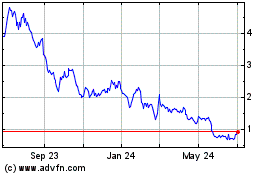Polestar and Rivian Initiate Report That Shows Car Industry to Overshoot IPCC 1.5-Degree Target by More Than 75% Without Urgent Action
February 07 2023 - 7:01PM
Business Wire
- New Pathway Report from Kearney shows that urgent action is
needed to prevent the car industry from massively overshooting
IPCC’s 1.5-degree limit
- Electrification alone is not enough: report recommends a
3-lever approach to set industry on the right path and calls for
new forms of collaboration to build rapid momentum
- Collective action to reduce greenhouse gas emissions in supply
chain and increase renewable energy in the grids is needed in
addition to faster EV adoption
Polestar (Nasdaq: PSNY) and Rivian (Nasdaq: RIVN) have
collaborated on a ‘Pathway Report' which concludes that the
automotive industry is set to overshoot the IPCC’s 1.5-degree
pathway by at least 75% by 2050. The two pioneering EV makers
initiated the report in response to the climate crisis. The report,
which uses existing, open-source data to model the current
trajectory for emissions stemming from the car industry, was
carried out by global management consulting firm Kearney.
Passenger vehicles currently account for 15% of all greenhouse
gas (GHG) emissions globally.1 The IPCC has stated that all GHG
emissions need to be reduced by 43% by 2030, and the report makes
clear that the automotive industry is far off track, and,
alarmingly, will have spent its full CO2e budget already by 2035
without urgent action.
Despite the gloomy outlook, the report suggests that the car
industry still has a chance to get on track. By redirecting
resources and focus, the industry can rapidly build the momentum
required to remain in line with the Paris Agreement. The Pathway
Report focuses on the current decade and outlines immediate, clear
actions that car manufacturers can take between now and 2030,
including some that can be triggered immediately.
The data presents a pathway based around three key levers. Lever
1 looks at the speed at which fossil fuel-powered cars need to be
replaced by electric cars but points out that this alone will not
be enough. A lot more work will be required for levers 2 and 3:
- Increasing renewable energy in power grids
- Reducing greenhouse gas emissions in the manufacturing supply
chain
Pulling just one or two levers in isolation will be insufficient
and only reduce the overshoot. Collective action from automakers is
needed on all three levers, in parallel, at a global level.
Firstly, the industry must accelerate the transition to electric
vehicles by investing in manufacturing capabilities, as well as
implementing a firm end date for fossil fuel car sales globally.
Secondly, build out renewable energy supply to global grids that
enable EV's to reach their full potential through green charging.
Thirdly, decarbonize the manufacturing supply chains for these
vehicles through switching to low carbon materials, and investing
in renewable energy solutions for supply chains.
Fredrika Klarén, Polestar Head of Sustainability, says: “Car
companies may be on different paths when it comes to brand, design,
and business strategies, and some won’t even admit that the road to
the future is electric. I believe it is, and that the climate
crisis is a shared responsibility, and we must look beyond tailpipe
emissions. This report makes clear the importance of acting now and
together. There’s a clear cost to inaction, but there’s also a
financial opportunity for innovators who find new answers to the
challenges we face.”
Kearney’s report has also been shared with several of the
world’s leading car makers, together with an invitation to a
roundtable held at the end of January to discuss areas of
collective action. The aim is to find a path towards unprecedented,
relevant and collective climate action for the car industry.
Anisa Costa, Rivian’s Chief Sustainability Officer, adds: “The
report’s findings are sobering. Our hope is that this report lays
the groundwork for the automotive industry to collaborate in
driving progress at the pace and scale we need – and ideally
inspiring other industries to do the same. Together, I’m confident
we can win the race against time.”
The Pathway Report clearly shows the cost of inaction and the
strong case for sustainable development. The investment community
is moving, and capital flows are shifting from traditional
investment to sustainable investment, recognizing an increasing
link between sustainable transformation and financial benefits. In
2021, global sustainability investments totaled USD 35.3 trillion,
representing over a third of all assets in five of the world’s
biggest markets.
Angela Hultberg, global sustainability director at Kearney,
says: “We are proud to have been chosen as a trusted expert to
develop this report. The result of our modeling clearly shows that
the industry needs to accelerate the pace of becoming a low carbon
industry. We looked at different scenarios, different data points,
and the conclusion is that no matter how you model it, we are far
too close for comfort. We sincerely hope this report will be a
starting point for the industry to focus on areas where there is
agreement and find specific initiatives. It will take collective
action to solve some of the issues at hand, and we look forward to
seeing what the manufacturers will do in the near future.”
More talks are planned over the coming months. Other car
manufacturers interested in partaking can contact
pathway@kearney.com.
Read the full report here.
__________________ 1
https://www.kearney.com/automotive/article/-/insights/polestar-and-rivian-pathway-report-
View source
version on businesswire.com: https://www.businesswire.com/news/home/20230207006161/en/
Rivian Harry Porter (UK) media@rivian.com
Polestar media@polestar.com
Polestar Automotive Hold... (NASDAQ:PSNY)
Historical Stock Chart
From Mar 2024 to Apr 2024

Polestar Automotive Hold... (NASDAQ:PSNY)
Historical Stock Chart
From Apr 2023 to Apr 2024
